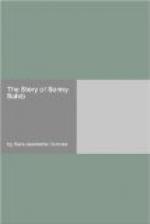In quite a short time—in Rubbulgurh, where there is no winter, two years is a very little while—Sonny Sahib grew too big for even this adaptation of his garments; and then Tooni took him to Sheik Uddin, the village tailor, and gave Sheik Uddin long and careful directions about making clothes for him. The old man listened to her for an hour, and waggled his beard, and said that he quite understood; it should be as she wished. But Sheik Uddin had never seen any English people, and did not understand at all. He accepted Tooni’s theories, but he measured and cut according to his own. Sheik Uddin could not afford to suffer in his reputation for the foolish notions of a woman. So he made Sonny Sahib a pair of narrow striped calico trousers, and a long tight-fitting little coat with large bunches of pink roses on it, in what was the perfectly correct fashion for Mahomedan little boys of Rubbulgurh and Rajputana generally. Tooni paid Sheik Uddin tenpence, and admired her purchase very much. She dressed Sonny Sahib in it doubtfully, however, with misgivings as to what his father would say. Certainly it was good cloth, of a pretty colour, and well made, but even to Tooni, Sonny Sahib looked queer. Abdul had no opinion, except about the price. He grumbled at that, but then he had grumbled steadily for two years, yet whenever Tooni proposed that they should go and find the captain-sahib, had said no, it was far, and he was an old man. Tooni should go when he was dead.
Besides, Abdul liked to hear the little fellow call him ‘Bap,’ which meant ‘Father,’ and to feel his old brown finger clasped by small pink and white ones, as he and Sonny Sahib toddled into the bazar together. He liked to hear Sonny Sahib’s laugh, too; it was quite a different laugh from any other boy’s in Rubbulgurh, and it came oftener. He was a merry little fellow, blue-eyed, with very yellow wavy hair, exactly, Tooni often thought, like his mother’s.
CHAPTER III
It was a grief to Tooni, who could not understand it; but Sonny Sahib perversely refused to talk in his own tongue. She did all she could to help him. When he was a year old she cut an almond in two, and gave half to Sonny Sahib and half to the green parrot that swung all day in a cage in the door of the hut and had a fine gift of conversation; if anything would make the baby talk properly that would. Later on she taught him all the English words she remembered herself, which were three, ‘bruss’ and ‘wass’ and ‘isstockin’,’ her limited but very useful vocabulary as lady’s-maid. He learned them very well, but he continued to know only three, and he did not use them very often, which Tooni found strange. Tooni thought the baba should have inherited his mother’s language with his blue eyes and his white skin. Meanwhile, Sonny Sahib, playing every morning and evening under the peepul-tree, learned to talk in the tongue of the little brown boys who played there too.




